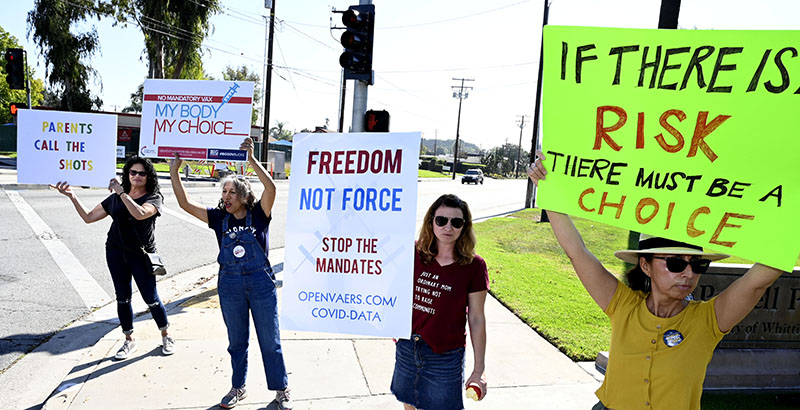New Research: Low Education Levels Strongly Tied to Being Unvaccinated, Major Contributor to Ongoing Hesitancy

Help fund stories like this. Donate now!
As schools across the country struggle to keep their doors open amid the Omicron surge, researchers have found a strong correlation between the unvaccinated and low levels of education.
It found more than half of unvaccinated American adults who reported strong hesitancy to the vaccine had a high school education or less. Five of the top 10 reasons for bypassing inoculation included lack of knowledge about its benefits and the risks of remaining unvaccinated.
A lack of confidence in the shot itself followed by concerns about side effects and distrust in government were listed as the greatest concerns among the vaccine hesitant, according to a draft version of the study, which will be published in an upcoming issue of the American Journal of Infection Control.
“Vaccine hesitancy is a complex problem across the U.S.,” said Saif Khairat, associate professor at the University of North Carolina at Chapel Hill and the study’s principal author. “And the root cause of that problem is different for different people.”
The study considered a number of variables, including the percent of households with no access to a vehicle; those who were unemployed; had less than a high school education; had trouble speaking English; identified as a member of a minority group; lived in poverty; were over 65 or were single parents with children under 18.
The paper centered on data collected by the Centers for Disease Control and Prevention as of May 9, 2021. It examined statistics from nearly every county in America — Texas did not provide vaccination data — in an effort to help policymakers better understand the characteristics of vaccine holdouts.
While the study focused on information gleaned more than eight months ago, the issue remains: Just 63 percent of Americans were fully vaccinated as of Jan. 20, according to the Mayo Clinic.
Vaccination rates vary widely by age. More than 84 percent of U.S. adults age 65 and older are fully inoculated, according to Mayo. The figure drops dramatically for children ages 5 to 11: It tops out at 48.4 percent of young children in Vermont and just 5.3 percent in Alabama. The CDC authorized vaccination for this age group in November.
Hospitals around the country continue to feel the strain — some at record levels — as COVID-related beds are filled mostly by patients who have not been inoculated. Some countries, buckling under the Omicron variant, are considering a vaccine mandate.
Former President Donald Trump, who once famously said he loves “the poorly educated,” downplayed the severity of the virus, though he was vaccinated. The notion has a stubborn hold on his most ardent followers who booed him at a recent event when he said he received a vaccine booster.
Khairat and his co-authors said public outreach targeting the undereducated should address the shot’s safety and effectiveness and include statistics on the percentage of people within their local community who have received the inoculation. Vaccine promotion efforts should incorporate discussion of a path back to normalcy through herd immunity — information, they said, best delivered by a trusted, locally recognized figure.
More than 10 percent of American adults ages 25 and older had not earned their high school diploma as of 2017, according to the American Council on Education. Another 29 percent graduated high school but did not further their education.
Anthony DiMaggio, associate professor of political science at Lehigh University, said his recent analysis shows that age is the strongest predictor of vaccination rates — but that education also plays a major role.
“What is not in question is that both factors are significant in accounting for whether people are vaccinated or not, with less educated Americans and those under 60 being less likely to have gotten at least two shots by mid-2021,” he said.
John A. Romley, associate professor at the University of Southern California, helped conduct a similar vaccination rate study earlier this year. He and his colleagues discovered that U.S. counties that scored high on both hesitancy and “social vulnerability” were “especially likely” to have lower COVID-19 vaccination rates than the rest of the nation.
Romley and his team have more recently begun to focus on children. Preliminary results from their latest efforts show socioeconomic disadvantage plays a larger role in vaccination rates for kids than it does for adults.
“Parents think about vaccinations for themselves differently than they think about vaccinations for their kids,” Romley said.
Some adults are required by their employers to take the vaccine. They also might realize they are more vulnerable to a more severe illness than their children, he said. Other unknowns, including the shot’s long-term impact, might also contribute to their hesitancy.
“Talking to people with respect and trying to persuade them is the only way to make progress,” Romley said. “But in these polarized times, the conversations we have are pretty heated and I don’t think that’s helping.”
Time has shown that mandates, not recommendations, are more effective in boosting vaccination rates.
California was the first state to push for a vaccine mandate for students back in October: The requirement would go into effect in July. Few other states have followed suit.
Individual school districts, including Los Angeles Unified, that tried the same tactic were met with immediate backlash and by the threat that additional students would go remote. New York City schools have so far not required students be vaccinated, with Mayor Eric Adams promising a decision on a mandate this spring.
But at least one New York City educator said mandates are not the answer, even in the face of the Omicron variant. Patrick Sprinkle, a high school social studies teacher at the N.Y.C. Lab School for Collaborative Studies in Manhattan, said he’s worried about inoculation rates and the spread of the virus, but doesn’t believe families should be forced to take the shot.
“This remains a pressing concern for me,” he said. “It is of the utmost importance that we encourage families to have their children vaccinated, however, a mandate is an unwise policy decision as it will push more students into ineffective remote learning and deny students the highest quality education possible.”
Help fund stories like this. Donate now!

;)
